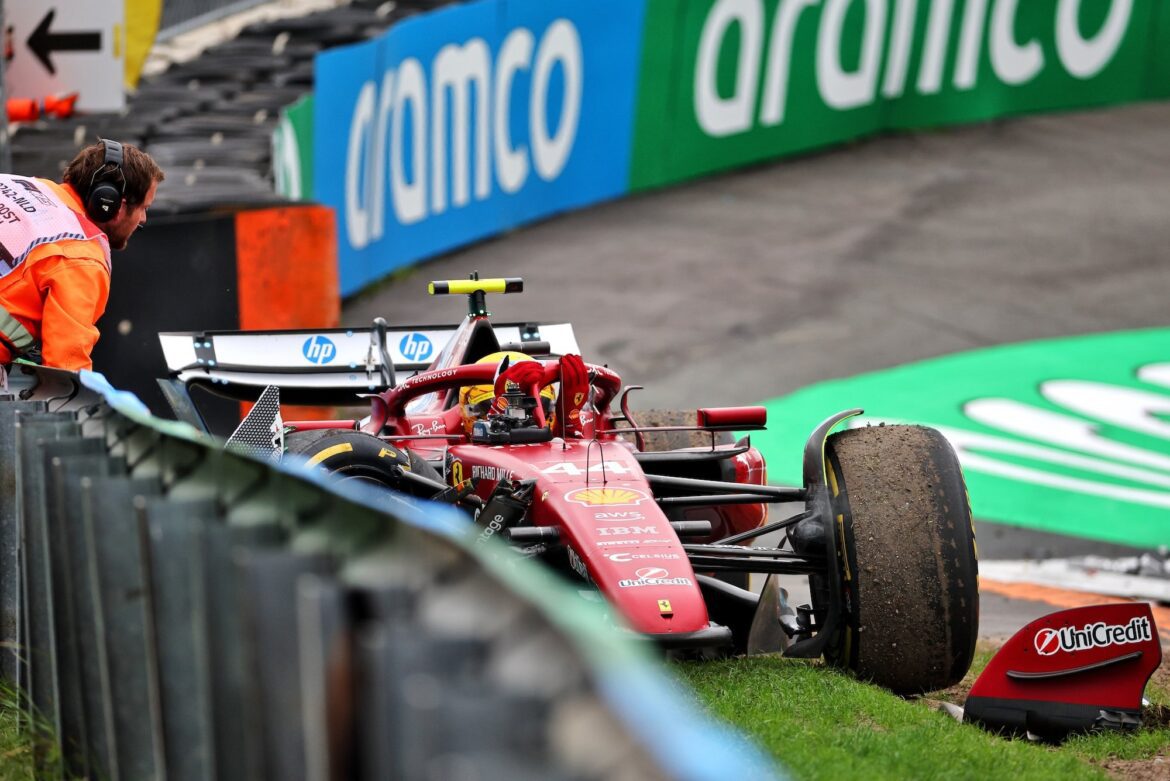Jacques Villeneuve Stands Up for Lewis Hamilton After Dutch GP Incident
In a recent statement, former Formula 1 driver Jacques Villeneuve expressed his support for Lewis Hamilton following an incident that concluded the British driver’s participation in the Dutch Grand Prix. Hamilton, a seven-time world champion, faced an unfortunate turn of events on lap 23 when he lost control of his car at turn 3 and collided with the safety barriers, leading to the deployment of the safety car.
Villeneuve’s Perspective on the Incident
According to Villeneuve, who won the championship in 1997, the mistake made by Hamilton should not solely be blamed on him. “This mistake by Lewis could have happened to anyone. Every driver, including Max Verstappen, has faced similar situations where they were caught off guard,” he remarked during an interview with Sky Sports. His comments highlight a broader understanding of the challenges drivers encounter on the track, emphasizing that errors can occur under various circumstances.
The Impact of Track Conditions
Villeneuve elaborated on the variable conditions that contributed to the accident, noting that the weather played a significant role. “It was drizzling. As a driver, you can’t always predict when your car might lose traction. It’s akin to driving in winter conditions; everything seems fine until you suddenly hit an icy patch,” he compared. This analogy underscores the unpredictable nature of racing, especially under challenging weather conditions.
The Technical Aspects of the Curve
Furthermore, Villeneuve pointed out that the specific configuration of the turn where Hamilton’s incident occurred was also a critical factor. “All the drivers were navigating through a painted area on the track. Lewis might have slightly misjudged his position, hitting a wetter spot and getting caught off guard. In moments like these, the driver can feel like a passenger in their own car. It may seem like a minor error, but it’s something that has happened to every driver at some point,” he concluded. This insight sheds light on the technical challenges drivers face and the fine margins that can lead to significant consequences during a race.
Hamilton’s Response to the Weekend
Despite the unfortunate ending to his race, Hamilton reflected positively on his overall experience during the weekend in the Netherlands. “It was a very consistent weekend. We made a lot of progress, and I feel that I’ve evolved,” said the veteran British driver. His perspective indicates a focus on growth and development rather than dwelling on a singular incident.
The Role of Weather in Racing Dynamics
Weather plays a pivotal role in motorsports, often dictating race strategies and influencing driver performance. In Formula 1, teams must be prepared for rapid changes in conditions, as even a light drizzle can affect tire grip and handling. Drivers, engineers, and strategists work closely to anticipate these changes, but the unpredictability of weather can still lead to surprising outcomes.
The Psychological Aspect of Racing
In high-stakes environments like Formula 1, mental fortitude is crucial. Drivers not only contend with physical challenges but also the psychological pressure of performing under intense scrutiny. The ability to remain calm and focused during unpredictable events is vital, and even the most seasoned drivers can find themselves in challenging situations.
Learning from Mistakes
The incident involving Hamilton serves as a reminder of the importance of learning from mistakes in racing. Each driver faces unique challenges throughout their careers, and incidents like these can provide valuable lessons. As Villeneuve noted, what may seem like a simple error can have significant implications, and drivers must analyze their experiences to improve their skills and performances.
The Competitive Nature of Formula 1
Formula 1 is marked by fierce competition, with drivers constantly pushing the limits of both their vehicles and their own capabilities. The stakes are high, and each race presents a new challenge. In this environment, the margin for error is razor-thin, and even the best drivers can experience setbacks.
The Importance of Teamwork
A driver’s performance on the track is often a reflection of the teamwork behind the scenes. Engineers, mechanics, and strategists work tirelessly to ensure that the car is optimized for the conditions and that the driver has the best possible support during a race. Hamilton’s positive reflection on his weekend indicates a collaborative effort that went beyond just the race itself.
The Evolution of Racing Technology
As technology continues to advance, so too does the complexity of racing. Modern Formula 1 cars are equipped with sophisticated systems that enhance performance, but these advancements also require drivers to adapt continuously. Understanding how to leverage technology while maintaining control in varying conditions is a skill that separates the top drivers from the rest.
The Legacy of Lewis Hamilton
Lewis Hamilton’s career has been marked by numerous achievements and records, but his journey has not been without challenges. Each race presents new opportunities for growth, and his ability to bounce back from setbacks has solidified his status as one of the sport’s greats. Hamilton’s resilience and commitment to improvement serve as an inspiration for aspiring drivers and fans alike.
The Future of Formula 1
As the season progresses, the dynamics within Formula 1 will continue to evolve. Teams will analyze performances, learn from incidents, and adapt their strategies accordingly. With a mix of seasoned veterans and emerging talents, the competition remains fierce, and each race will bring its own set of challenges and opportunities.
Conclusion
In the world of Formula 1, the path to success is paved with both triumphs and tribulations. The support from fellow drivers, like Villeneuve’s backing of Hamilton, reflects the camaraderie that exists within the competitive landscape. As drivers navigate the complexities of the sport, they must remain focused on their goals while learning from every experience, whether good or bad. As Hamilton looks to the future, his commitment to growth and improvement will undoubtedly play a crucial role in shaping his legacy within the sport.
